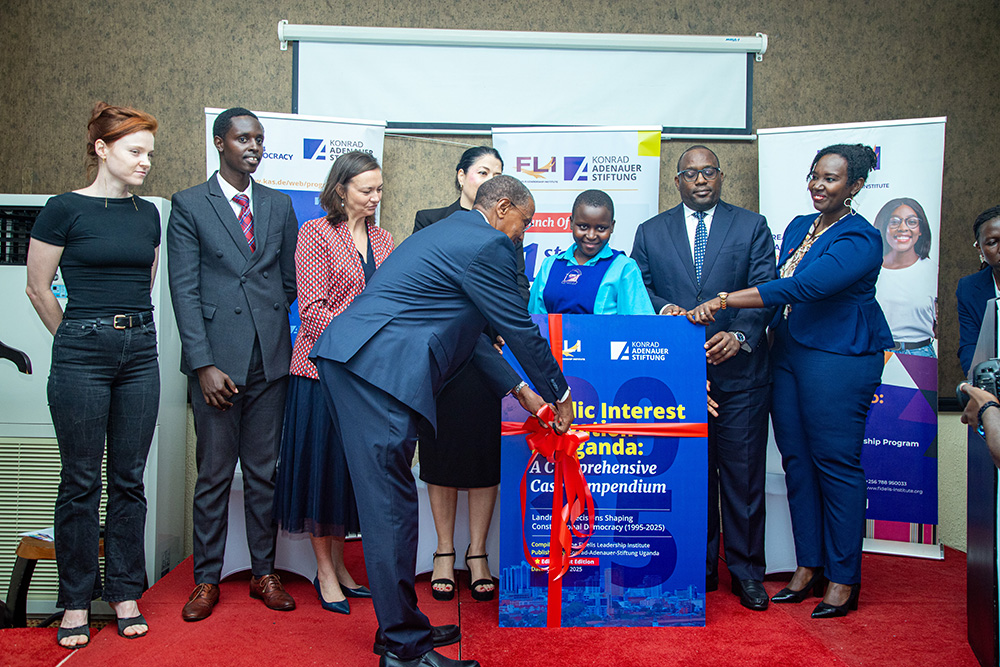Former DCJ criticises Parliament over Supreme Court election reforms
“Compliance with court orders is a pressing issue that requires immediate attention,” Buteera stated, emphasising the need for electoral reforms, particularly in presidential elections. He made the remarks on Thursday during the launch of the public interest litigation case compendium at Sheraton Hotel in Kampala.
Former Deputy Chief Justice, Richard Buteera launching of the Public Interest Litigation. (Courtesy photo)
__________________
Former Deputy Chief Justice Richard Buteera has faulted the Parliament of Uganda for what he termed as failure to adhere to the Supreme Court recommendations regarding making laws pertaining to presidential elections.
“Compliance with court orders is a pressing issue that requires immediate attention,” Buteera stated, emphasising the need for electoral reforms, particularly in presidential elections. He made the remarks on Thursday during the launch of the public interest litigation case compendium at Sheraton Hotel in Kampala.
The judgements were compiled by Fidelis Leadership Institute and Konrad Adenauer Stiftung, a political foundation in Germany. The compendium has 24 landmark public interest litigation decisions. A notable case is that of the former Nakawa Member of Parliament, Michael Kabaziguruka, against the Attorney General, where the Supreme Court ruled that subjecting civilians to military courts is unconstitutional.
Addressing the gathering composed of high-profile members of the legal fraternity, Buteera noted that despite the Supreme Court’s recommendations for electoral reforms following former Prime Minister Amama Mbabazi’s presidential election petition against Yoweri Kaguta Museveni, Parliament has not acted on the proposals.
Former Deputy Chief Justice, Richard Buteera launching of the Public Interest Litigation. (Courtesy photo)
“In the past elections, the Supreme Court has also made recommendations with the need for reforms in election laws, but these calls have gone unheeded by the Executive and the Legislature,” he observed.
Buteera said a litigant or the Attorney General can seek enforcement of court orders and ensure that individuals who fail to comply with it are held accountable.
In a petition Mbabazi filed against Museveni, the Supreme Court recommended a review of the timeframe for filing presidential election petitions, suggesting an extension to at least 60 days to allow parties and the court sufficient time to prepare, present, hear and determine petitions.
Currently, the law provides that litigants should file election petitions within 10 days and 30 days for the court to analyse evidence and make a decision, as outlined in Article 104 (2) and (3) of the Constitution and section 59 (2) and (3) of the Parliamentary Elections Act. The Supreme Court also recommended that the Parliamentary Elections Act be amended to prohibit the giving of donations by all candidates, including the President, during campaigns. The court further recommended that the law be amended to explicitly prohibit public servants from participating in political campaigns.
The Solicitor General Pius Perry Biribonwoha, Pius Biribonwoha, described the compendium of judgments as a dynamic and transformative facet of the country’s jurisprudence.
He said the compendium showcases the evolving role of courts in shaping the rule of law, promoting good governance, deepening democracy, and safeguarding fundamental human rights.
According to Biribonwoha, public interest litigation has become a crucial tool for ensuring justice accessibility, particularly for marginalised communities and those unable to directly access the courts.
He said the compendium serves as a resource for legal practitioners, scholars, and students, in enriching their research.
Biribonwoha also said the compendium promotes accountability and transparency, reinforcing the principles that no one is above the law and the constitution is supreme.
“By embracing public interest litigation, Uganda demonstrates its commitment to the rule of law and justice for all,” Biribonwoha noted, saying justice must serve as both a shield and a sword for protecting rights and advancing the common good.
Renowned city lawyer Ladislaus Rwakafuuzi emphasised the need for more judges in the higher courts (Supreme Court, Court of Appeal/Constitutional Court and High Court), citing the prolonged duration of cases.
Currently, the Supreme Court has 11 justices, while the Court of Appeal/Constitutional Court has 20 justices. The High Court has 88 judges, with 22 in acting capacity.
He noted that some accused persons spend over 12 years on remand in Luzira Prison without trial.
City lawyer Eron Kiiza said the problem with public interest litigation is that it is difficult to be effective in an oppressive or repressive atmosphere, adding that Uganda lacks an efficient justice system.
“Justice delayed is justice denied. Delaying cases infringes upon the right to an expedited trial, which is the fundamental part of a fair trial,” he said.